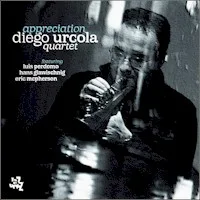Styles: Trumpet Jazz
Year: 2016
File: MP3@320K/s
Time: 109:28
Size: 251,3 MB
Art: Front
(10:25) 1. Zoltan
( 7:32) 2. Sweet Love of Mine
(11:17) 3. Time Is Right
( 8:28) 4. Just a Ballad for Woody
( 8:34) 5. In a Capricornian Way
( 9:08) 6. Blues for Woody and Khalid
( 9:06) 7. Tomorrow's Destiny
( 9:57) 8. Joshua C.
( 8:28) 9. On the New Ark
(11:11) 10. Song of Songs
(15:18) 11. Madera Latino Suite
Madera Latino: A Latin Jazz Perspective on the Music of Woody Shaw
Year: 2016
File: MP3@320K/s
Time: 109:28
Size: 251,3 MB
Art: Front
(10:25) 1. Zoltan
( 7:32) 2. Sweet Love of Mine
(11:17) 3. Time Is Right
( 8:28) 4. Just a Ballad for Woody
( 8:34) 5. In a Capricornian Way
( 9:08) 6. Blues for Woody and Khalid
( 9:06) 7. Tomorrow's Destiny
( 9:57) 8. Joshua C.
( 8:28) 9. On the New Ark
(11:11) 10. Song of Songs
(15:18) 11. Madera Latino Suite
The asymmetric rhythms belonging to the Afro-Cuban tradition substantiate this extraordinary double CD by Brian Lynch , who with Woody Shaw shares the sad destiny of being a great musician, but not very exposed to the light of the big stages. With the missing trumpet player, Lynch also shares a love for an all-round expressive dimension, capable of incorporating both a lyrical and nocturnal dimension, and a more energetic figure. The work in question is emblematic in this sense, which incorporates the polyrhythmic trend of Afro-Cuban percussion with the more canonical symmetric times of jazz. The result is a gripping work where everything works wonders and once again confirms the whole class of the leader. As a common denominator, Lynch's rare ability to infuse with his mobile solism what seems to be the essence of jazz: communicative, pathos, ability to transmit deep emotions contained in the unrepeatable and unique moment of jazz improvisation. His big band fully captures and manages to return all the expressive figure of Shaw, as oblique and irregular as lyric and peaceful. His compositions are here revisited with admirable intelligence and originality to give rise to a project of stringent consistency and rigor. An unmissable album that adequatamante pays homage to the masterful artistic figure of a complete and ductile musician, who made the most important business cards of refined refinement and technique. ~ Maurizio Zerbo https://www.allaboutjazz.com/a-latin-jazz-perspective-on-music-of-woody-shaw-bryan-lynch-hollistic-musicworks-review-by-maurizio-zerbo.php
Personnel: Brian Lynch, Sean Jones, Dave Douglas, Diego Urcola, Etienne Charles, Mike Rodriguez, Josh Evans, Philip Dizack, Bryan Davis: trumpet; Zaccai Curtis: piano; Luques Curtis: double bass; Obed Calvaire: battery; Pedrito Martinez, Little Johnny Rivero, Anthony Carrillo: percussion.
Personnel: Brian Lynch, Sean Jones, Dave Douglas, Diego Urcola, Etienne Charles, Mike Rodriguez, Josh Evans, Philip Dizack, Bryan Davis: trumpet; Zaccai Curtis: piano; Luques Curtis: double bass; Obed Calvaire: battery; Pedrito Martinez, Little Johnny Rivero, Anthony Carrillo: percussion.
Madera Latino: A Latin Jazz Perspective on the Music of Woody Shaw





